Kansas Governor's Newsletter January 2020

-
In this Issue:
- From the Governor
- Finance Committee
- Membership Committee
- Planning Committee
- Health and Public Policy Committee
- Physician Wellness
- Early Career Physicians Committee
- Congratulations on Admission to Fellowship!
- Mark Your Calendar
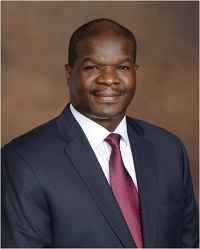
Isaac O. Opole, MD, PhD, FACP, ACP Governor
From the Governor
Dear Colleagues,
As 2020 begins, we should all look back at our successes and achievements through the past year, but also look forward to opportunities and challenges in this new year, and years to come. In Kansas, 2019 started with some excitement when Governor Kelly emphatically stated on Advocacy Day that healthcare expansion was at the top of her legislative agenda. On January 29, the Medicaid expansion bill was re-introduced in the House and Senate, but unfortunately was not debated. The House later passed an expansion bill which failed to make the senate calendar for a vote. Despite all the political skullduggery, there still is a bipartisan consensus that something needs to be done to expand healthcare coverage to our vulnerable population, especially in the light of recent research showing that simple access to healthcare coverage reduces mortality (D’uh?).
As a professional community, “covering the uncovered” will remain a continuing challenge. As we look into the future, I would like to urge all of our members (and non-members too!) to provide constructive feedback to our legislators and help find solutions that will make meaningful changes to the status quo.
At the national level, I have encountered two interesting perspectives of the challenges and opportunities ahead.
The first perspective is from Holly Buckley, a partner at law firm McGuireWoods, speaking at the16th Annual Future of Spine + The Spine, Orthopedic & Pain Management-Driven ASC Conference in Chicago. She listed her eight most disruptive issues facing the healthcare industry in the future:
- Presidential healthcare policy
- Private equity investment in healthcare
- Artificial intelligence
- Precision medicine
- Retailers as primary care physicians
- Millennials as consumers
- Internet of things
- Nontraditional entrance into the market
Ms. Buckley describes the seesaw of party and presidential politics as a cause for uncertainty, while the entrance of private equity and “non-traditional” players like Amazon and Google into the healthcare arena offer both optimism and caution. Artificial intelligence and precision medicine are exciting opportunities for research and progress in healthcare delivery, while connected devices, including medical devices joining the “internet of things,” will take a more prominent role in clinical data and decision-making, particularly as the millennial generation adopts these technologies and take on leadership roles in healthcare.
In my opinion, the most immediate and potentially disruptive element from Buckley's list is the “creeping in” of retailers such as CVS, Wal-Mart and Walgreens into the primary care space. Many offer “free” health screenings and vaccinations, and some are piloting fully fledged “in-house” clinics that will offer a variety of primary care services. However, questions arise as this business model develops: Will they be complementary or competitive? Will they offer quality services at low cost, or will they use the promise of low cost and convenience as a hook to upsell other items or services? What will the business impact be when physician practices lose the “healthy” patients to these clinics, while having to care for the sicker, more complex patients? Internists and other physicians will need to contend with these changes and remain vigilant and cognizant of how they will impact our practices and the delivery of care to our patients.
Another perspective is from the leadership of the Healthcare Executive Group (HEG), who undertook a year-long survey to identify their top ten future Challenges, Issues, and Opportunities:
- Costs and transparency
- Consumer experience
- Delivery system transformation
- Data and analytics
- Interoperability/consumer data access
- Holistic individual health
- Next-generation payment models
- Accessible points of care
- Healthcare policy
- Privacy/security
Data access and interoperability are major considerations as we attempt to provide seamless care for our patients across healthcare systems. Data and analytics will likely be one of the drivers of health policy decisions, while privacy and security remain significant threats to individual patients and healthcare systems. As far as payment models are concerned, “the future is now,” with CMS, major payers and healthcare organizations developing principles around next-generation payment models. In the words of one healthcare leader, “fee-for-service is dead.” Internists and other physicians will need to pay more attention to cost and transparency, transform our healthcare delivery practices and revamp our patient experiences to offer care that is easily and universally accessible, efficient, effective and patient-centered.
Again, one item particularly stands out in my mind: Delivery system transformation. We have already seen a seismic shift in the way we practice, shifting from a predominance of physician-owned practices to a physician-employed model. More seismic shifts are under way, as health systems continue to integrate, the rise of private capital and profitability models begin to dominate the healthcare landscape, and, particularly in our state, small rural hospitals either close or are taken over by large health systems. Amidst all this, we should not forget that none of these plans or changes can succeed without our professional knowledge and skill, and we should not allow tour capacity for care to become a commodity to be sold to the highest bidder.
There are, indeed, challenging times ahead but the new year also brings hope and optimism for members of the College. The College is growing in membership, our ‘army” now surpassing 150,000 members globally. We continue to be the pre-eminent voice of reason in advocacy and health policy, and our partnership in the “Group of Six" with the American Academy of Pediatrics (AAP), the American Academy of Family Physicians (AAFP), the American College of Obstetricians and Gynecologists (ACOG), the American Psychiatric Association (APA), and the American Hospital Association (AHA) promises to create a bulwark that will enable us to weather future storms while enabling us to reach for the future. It is a great time to be a member of the College, and I.M. proud to be an internist!
Isaac O. Opole, MD, PhD, FACP
Governor, ACP Kansas Chapter
Finance Committee
As previously noted, we have decided to keep the investment accounts with Wells Fargo at this time. Since the new fiscal year started July 1st our chapter has received $40,074.14, spent $21,625.83, leaving $68,448.88 in reserves, with our total equity at $151,962.96. Our invested funds at Wells Fargo totaled $83,514.08 as of November 30, 2019, increasing by $4089.29 since January 1, 2019.
Membership Committee
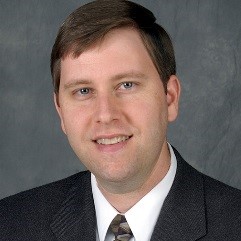
The membership committee held a conference call in September.
The committee will be focusing on identifying members for Fellowship. Along this line, the committee will also be evaluating the list of potential Fellows and update the list to maximize our efficiency in the coming years. If you have individuals you think may be Fellow candidates, please notify Denise Lantz dlantz@kmsonline.org or myself at ssmileymd@yahoo.com.
We are continuing to look at ways to engage members in rural areas. I would welcome comments from those of you in more remote settings to contact me with ideas.
I continue to look for individuals willing to serve on the membership committee. We would like to see our younger physicians become more involved with the state chapter. I would especially welcome members from outside of the Wichita and Kansas City areas so we can continue to reach out across the state. That said, I welcome anyone willing to serve on the committee.
Regards,
Scott Smiley, MD, FACP
Membership Committee Chair
Planning Committee
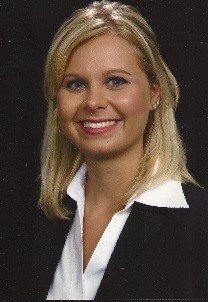
The Kansas ACP chapter meeting was a resounding success. We had 2 days of exceptional speakers providing clinical pearls in a diverse subset of topics. Attendees were able to select inpatient and outpatient tracks allowing each internist to tailor their educational activities to their primary practice setting. We featured an expert panel in sepsis that highlighted recent updates in treatment and some of the more controversial topics from the viewpoints of general medicine, pulmonary critical care, nephrology, and infectious disease. We had 11 student posters and 53 resident posters that featured unique case presentations and student and resident research projects. We are eagerly planning the next chapter meeting and hope to see each of you next year.
Kindest Regards,
Tiffany Schwasinger-Schmidt, MD, PhD
Planning Committee Chair
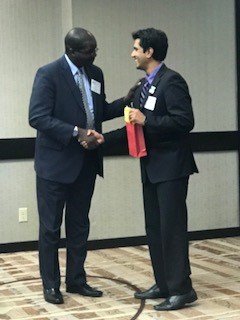
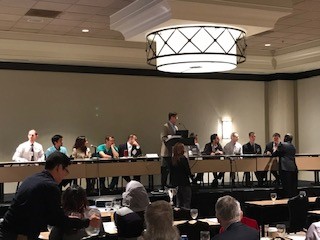
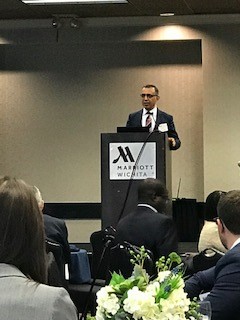
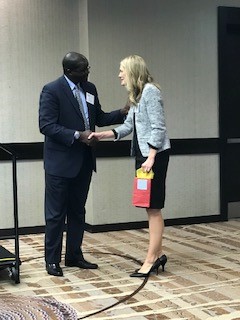
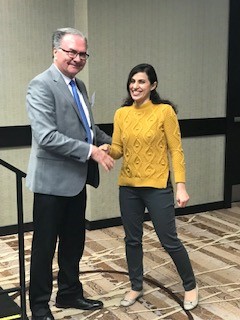
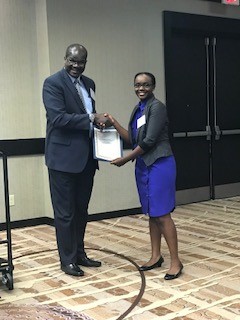
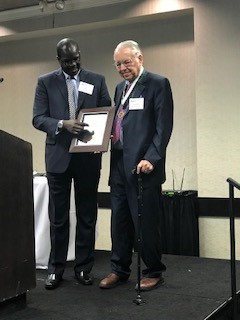
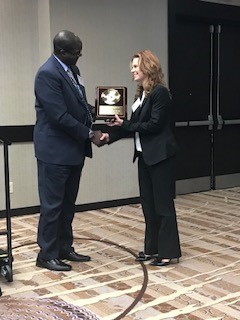
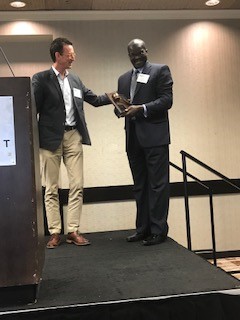
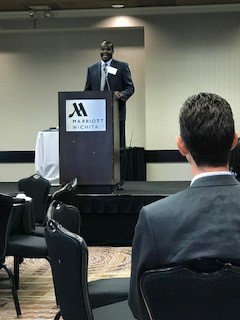
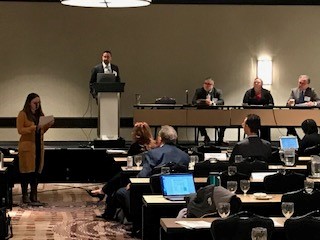
Health and Public Policy Committee
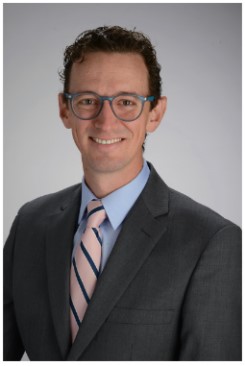
We've had a successful year of health policy engagement at the state and national level with our Kansas Advocacy Day and ACP Leadership Day. I have stepped down as HPP chair as I take on the role of Governor-elect for the chapter. Dr. Ben Quick has assumed the role of Health and Public Policy Committee Chair. He has been involved with the committee for the past several years. He has a passion for health policy work and will provide excellent leadership to the chapter with these efforts. We hope to continue to increase involvement of chapter members in our advocacy efforts. Our patients are depending on it!
Ky Stoltzfus, MD, FACP
Governor-elect
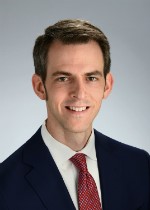
Our Kansas ACP Chapter will participate in Advocacy Day along with the Kansas Academy of Family Physicians on Wednesday, January 29, 2020 in Topeka, KS. We invite all ACP members, including residents, fellows, and medical students, to attend this important event. No prior advocacy experience is required. Legislative priorities will be reviewed in the morning followed by meetings with legislators in the afternoon. To register, please email Denise Lantz at dlantz@kmsonline.org and request a registration form. Registrations will be accepted through Friday, January 17, 2020.
If there are specific priorities for health policy that you feel our chapter should address, please let me know. I welcome broad involvement by ACP members in crafting our local efforts. You can reach me by email at bquick2@kumc.edu.
Sincerely,
Benjamin Quick, MD, MPH
Health & Public Policy Chair
Physician Wellness
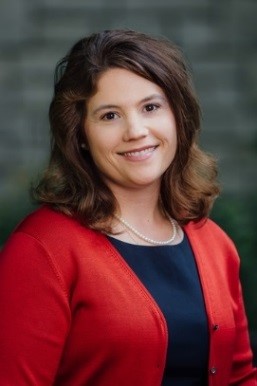
It's a typical evening in our home after our children are in bed—sitting on the couch, laptops out, tying up the loose ends of the day. On my computer there are phone messages, labs and documents to review, and notes to finish before the patient care begins tomorrow. The EMR that was supposed to solve medicine's problems have created a new set—for every hour of patient care, it's another 1-2 hours of documentation!
But what if it didn't have to be this way? As we continue to focus on wellness, another aspect is work/life balance. We often think the problems are a system issue (I'm not saying that they aren't), but there are some things that we can consider that could change the landscape. As we approach the winter flu season, efficiency becomes even more important. Consider a few of these tips in your evaluation of your time. A study by Dr. Mark Linzer in the Journal of General Internal Medicine in 2015 showed that optimizing workflow decreases burnout by a factor of six and is the most beneficial thing we can do to decrease burnout.
- Have an MA do data entry—have all individuals working at the top of their degree in your clinical setting. In our clinic, patients fill out paperwork for their physical and new patient appointments that list their medical history, medications, allergies, family and social history and complete review of systems. This information is entered by a nurse generally so we can focus on those areas that we need to. What tasks can you delegate?
- Consider “desk top slots” or spots blocked in your schedule for catch up time.
- Increase visit time for patients who routinely require more time to keep you from falling farther behind in your day.
- Utilize nurse coordinators if there are social issues that occupy your time with patients that you could direct someone else to help guide patients.
- Build time at the end of your day to allow catch up to avoid doing as much or any at home. One Mayo clinic altered the clinic schedule so the last patient of the day was a follow up rather than an acute who came in with a complex situation that routinely put individuals out the door late to pick up their children. In that clinic, getting out on time and finishing the day with a more controlled situation was valued by their doctors.
- Consider a scribe to help with documentation.
Use your commute home or time in an elevator or waiting to pick up a child to evaluate your work flow, it doesn't have to be a long strategic planning session, rather something you can mull over and evaluate the steps of the process. Concerned your administrator will be resistant to changes due to time, productivity, patient access, or loss of revenue? Studies show it costs $250,000-$1,000,000 to replace an MD, $25,000/year for a scribe, $8,000/year for resiliency training but there is no cost to listen, work on aligning values, customizing schedules, and emphasizing balance.
At the recent Kansas ACP Scientific meeting, Dr. Christopher Cassidy gave an excellent talk on moral injury. He encouraged us to speak with our peers, show peer support. Find what others might use as solutions to these challenges or work together to talk to your administrators about system solutions. Working together we can be much more effective in our changes. For other tips on workflow and efficiency you can visit the ACP website or email me with questions or concerns at seschase@gmail.com
Segen E. Smith Chase, MD, FACP
Wellness Champion
Early Career Physicians Committee
If you are an Early Career Physician (defined as within 16 years of completing medical school), please consider joining our ECP Committee. This committee has been re-engaged, as the input of the ECP Committee members regarding the efforts of the Chapter are very valuable. I am reaching out to all potential members, requesting your service on this committee. Please respond to Denise Lantz at dlantz@kmsonline.org indicating your interest in serving on this committee.
Congratulations on Admission to Fellowship!
Yasmine Hussein Agha, MD, has been accepted to the ACP Health Policy Internship. Great work!
Mark Your Calendar:
January 29, 2020 – Kansas Chapter, ACP Advocacy Day, Topeka, KS
April 23-25, 2020 – Internal Medicine Meeting 2020, Los Angeles, CA
October 8-9, 2020 (tentative) – Kansas Chapter, ACP Scientific Meeting, Kansas City area

